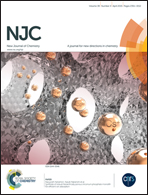The influence of the nature of organosilane surfactants and their concentration on the formation of hierarchical FAU-type zeolite nanosheets
Abstract
FAU-type zeolite (NaX) materials were synthesized in the presence of 5 organosilane surfactants [(CH3O)3SiC3H6N(CH3)2–CxH2x+1]Cl (x = 4, 8, 12, 16, 18) (denoted QASiCx) in order to introduce intracrystalline mesoporosity in the FAU-type structure. The influence of the nature of organosilane surfactants (length of the alkyl chain) and their concentrations in the synthesis medium was investigated to determine their impact on the formation of hierarchical FAU-type zeolite nanosheets. Under the basic conditions of faujasite X synthesis, (CH3O)3Si– bonds hydrolyze to –Si–OH, and yield –Si–O–Al- and –Si–O–Si-linkages that anchor to a zeolite framework. These linkages and the formation of micelles by the alkyl chains of the surfactants lead to the formation of mesopores and inhibition of the NaX crystallite growth, leading to the formation of FAU-type nanosheets depending on the alkyl chain length. Scanning electron microscopy (SEM) and transmission electron microscopy (TEM) images showed that FAU-type zeolite nanosheets were obtained only using surfactants composed of a minimum twelve carbon alkyl chain. X-ray diffraction results revealed that the optimum concentration of the organosilane to obtain a pure FAU-type material is 0.011 M. Above this concentration, the impurity phase and amorphous materials are observed. This simple approach paves a new way for obtaining hierarchical zeolite materials of controlled porosity by a direct approach for specific catalytic applications.


 Please wait while we load your content...
Please wait while we load your content...